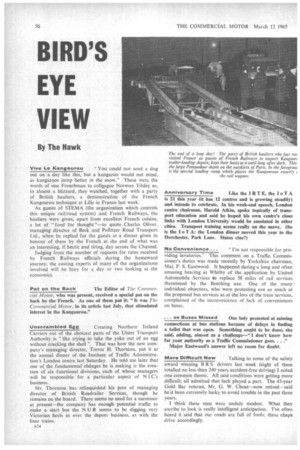BIRD'S EYE VIEW
Page 58

If you've noticed an error in this article please click here to report it so we can fix it.
By The Hawk
Vive Le Kangourou "You could not send a dog out on a day like this, but a kangaroo would not mind, as kangaroos jump better in the snow." These were the words of one Frenchman to colleague Norman Tilsley as, in almost a blizzard, they watched, together with a party of British hauliers, a demonstration of the French Kangourou technique at Lille in France last week.
As guests of STEMA (the organization which controls this unique rail/road system) and French Railways, the hauliers were given, apart from excellent French cuisine, a lot of "food for thought "—to quote Charles Oliver, managing director of Beck and Pollitzer Road Transport Ltd., when he replied for the guests at a dinner given in honour of them by the French at the end of what was an interesting, if hectic and tiring, day across the Channel.
Judging from the number of requests for rates received by French Railways officials during the homeward journey, the costing experts of many of the organizations involved will be busy for a day or two looking at the eco no mics.
Pat on the Back The Editor of The Commer cial Motor, who was present, received a special pat on the back by the French. As one of them put it: "It was The Commercial Motor, in its article last July, that stimulated interest in the Kangourou."
Unscrambled Egg Creating Northern Ireland
Carriers out of the choicest parts of the Ulster Transport Authority is like trying to take the yoke out of an egg without cracking the shell ". That was how the new company's managing director, Trevor H. Thornton, put it at the annual dinner of the Institute of Traffic Administration's London centre last Saturday. He told me later that one of the fundamental chinges he is making is the creation of six functional divisions, each of whose managers will be responsible for a particular aspect of N I C's business.
Mr. Thornton has relinquished his post of managing director of British Roadrailer Services, though he remains on the board. There seems no need for a successor at present—the company has enough potential traffic to make a start but the N U R seems to be digging very Victorian heels in over the depots business, as with the liner trains.
112‘1
Like the IRTE, the IoTA is 21 this year (it has 12 centres and is growing steadily) and intends to celebrate. In his week-end speech, London centre chairman, Harold Atkin, spoke topically of transport education and said he hoped his own centre's close links with London University would be emulated in other cities. Transport training seems really on the move. (So is the I o T A: the London dinner moved this year to the Dorchester, Park Lane. Status clue?)
Anniversary Time
No Convenience ... I'm not responsible for pro viding lavatories." This comment on a Traffic Commissioner's duties was made recently by Yorkshire chairman, Maj. F. S. Eastwood. It happened during a long and often amusing hearing at Whitby of the application by United Automobile Services lb replace 58 miles of rail services threatened by the Beeching axe. One of the many individual objectors, who were protesting not so much at the proposed bus services as at the loss of the train services, complained of the inconvenience of lack of conveniences on buses.
... so Buses Missed One lady protested at missing
connections at bus stations because of delays in fmding &toilet that was open. Something ought to be done, she said, adding, almost as a challenge—" I don't know how far your authority as a Traffic Commissioner goes. . .."
Major Eastwood's answer left no room for doubt.
More Difficult Now Talking to some of the safety
award winning B R S drivers last week (eight of them totalled no less than 240 years accident-free driving) I noted one common theme. All said conditions were getting more difficult; all admitted that luck played a part. The 43-year Gold Bar veteran, Mr. G. W. Choat—now retired—said he'd been extremely lucky to avoid trouble in the past three years.
I think these men were unduly modest. What they ascribe to luck is really intelligent anticipation. I've often beard it said that our roads are full of fools; these chaps drive accordingly.
























































































































